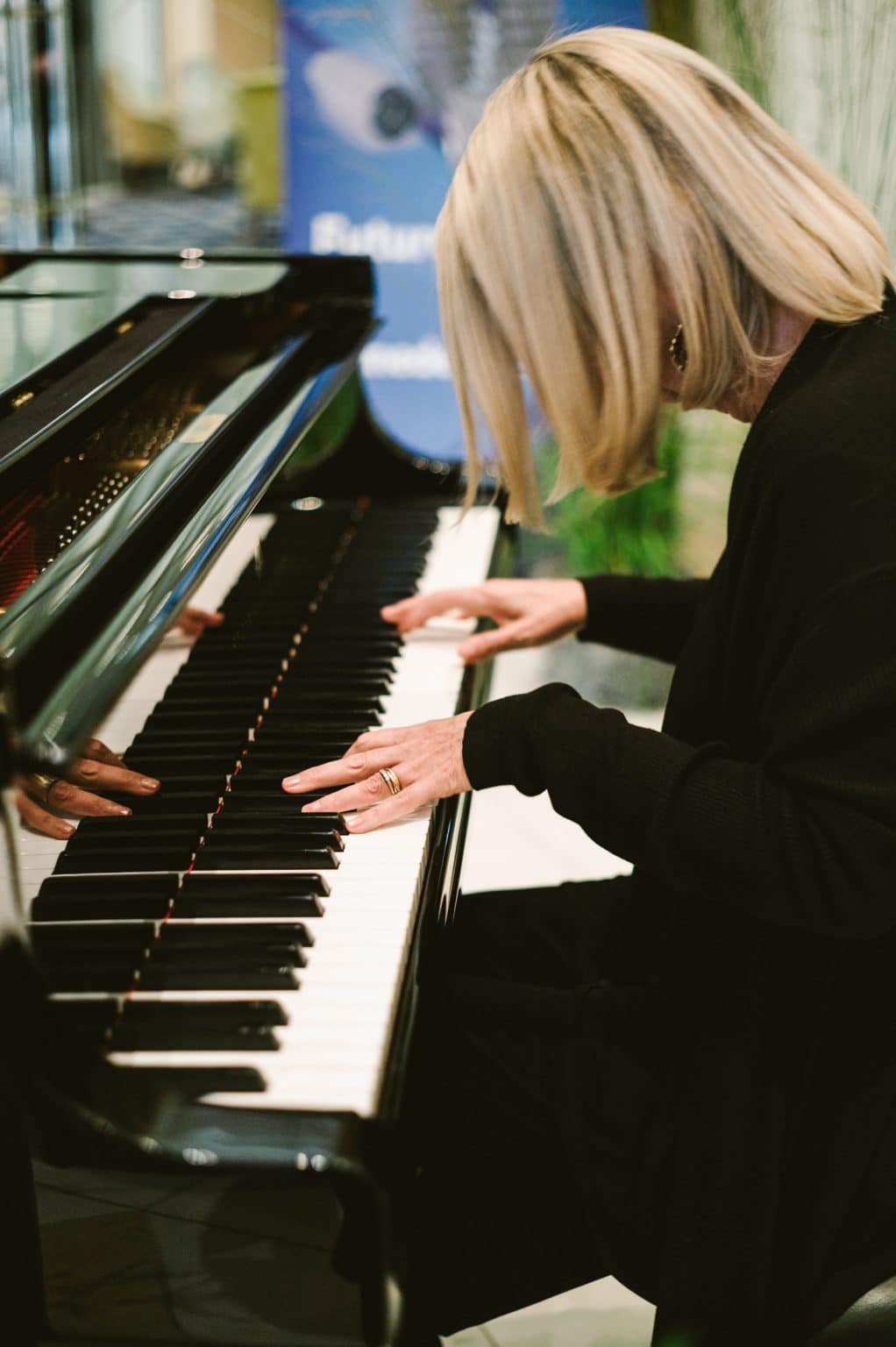We’re in the zone—reading, contemplating the day’s highlights and lowlights, planning dinner, waiting to board a flight, worrying about our dwindling savings accounts, or, in my case, playing the piano in a tranquil, upscale lounge, when—zap—out of nowhere the metallic, artificial, staticky sound of someone’s speaker phone slices our reverie to shreds.

I have arguably the best job in the world. I play the piano in an elegant Grand European hotel, a hub of tranquility. It’s pretty much the job of my dreams. When a gaggle of people have a real-life convo in my lounge, it rambles along at a nice, subtle volume that provides a suitable acoustic cushion for my music. Occasionally I can make out a word or two, or hear laughter, or a heated discussion. The jingle-jangle of real, talking human-beings is part of my Piano Girl soundtrack. I love the rumble and bebop of real people talking. But the noxious reverberation of the speaker phone—also known as the handheld boom box—has thrown me off balance.
I understand the need to stay connected. The smart phone has truly changed my life for the better, especially when it comes to my far-flung family. I love staying in touch as much as the next guy. But as society becomes less civilized it seems we’re losing respect for the shrinking quiet zones of our fellow human beings. We need to recognize that sharing our banal and beautiful experiences with family and friends—via our precious cell phones—should not grant us the right to trespass on the private auditory space of our neighbors.
In the last few months, while sitting at the Steinway, I’ve been an unwilling, piano-playing witness to the sounds of a mundane conversation about groceries, a Backstreet Boys highlights reel, a bland business discussion about the profit margins of a shoe company, an on-line shooter game, a best-of slasher film retrospective, and something that sounded suspiciously like Bonanza in German.
We can’t blame the younger generations—they have an on-point air pod game. Hats off to the kids! But beware of the middle-aged person sitting alone, checking her phone while sipping Sauvignon Blanc. It’s often the case that one of my single, bored guests will decide, via speaker phone, to SKYPE Great Aunt Edna in Weehawken or, worse yet, Facetime with little Mustafa in Lahore. Those Facetime sessions with toddlers are the lowest, maybe even worse than the shooter games or Abba videos. Not only do I hear the kid’s squeaky electronic voice, but I also hear the adult on the live end of the call natter on in baby talk. Loud baby talk coming from an adult—is there anything more insufferable?
Meanwhile, the peaceful mood in the room created by my music—the one I’ve spent forty-five years cultivating—is shattered by a grandparent saying—in a high nasal voice—goo-goo ga-ga in Urdu, or Danish, or Tennessee accented English.
Note: Goo-goo-ga-ga sounds the same in any language.
I once had a Korean influencer live stream from my piano, narrating my music, while viewers of the stream made comments that she recited outloud as they came in; I had a man from Milan Facetime his grandchildren while I was playing so he could show them the piano and ask them (in baby talk) if they wanted to request anything (they shouted at me in earsplitting toddler Italian); I once encountered an enthusiastic guest who found my music on Spotify and then came and played it for me while I was playing. Situations like this are not unusual—I play a few hundred live gigs a year and lately almost every one of them features a cell phone infringement.
A fact: The sound of a screeching kitty coming through a smart phone speaker, is ever so much louder than the sound of a real screeching kitty. Electronic sound eclipses acoustic sound every time, and not in a good way. It cuts through the air at a frequency that manages to be both offensive and captivating. You can’t not listen.
It’s not just me. Some of my guests squirm at the cacophony of speaker phone noise. Others don’t seem to care—I salute them for being so Zen. No one in the upscale hotel industry, and I mean no one, has figured out how to diplomatically ask a paying customer to turn off the volume or leave the room. I’m hoping a modern-day tech-savvy Emily Post will come up with a suitable way to diplomatically deal with the culprits. I’m envisioning a tastefully designed card placed discreetly on every cocktail table, directing our guests—perhaps with visual aids—to either power down the volume or leave the area to make their Facetime calls.
We have smoking lounges, so why not speaker phone areas? People who insist on using their speaker phones in public places can go to the Loud Room and compete with everyone else. They can Facetime each other Facetiming. They can goo-goo-ga-ga to their hearts’ content until the tinny voices emitting from the phones become an electronic wail of joyful connection.
I’m guessing most of my readers—the musicians, artists, and civilized, hip people who regularly visit this blog—are cell phone compliant. So, do me a favor and spread the word to the noisy others.
Put your phone on silent, send a text, use your pods. Swallow your pride and ask the nearest teenager (or pianist) for help. But please—turn off the speaker phone. And if you can’t figure out how to do that, go to the Loud Room. You’ll have lots of company.
***
Robin Meloy Goldsby is a Steinway Artist and popular solo piano streaming artist. She is the author of Piano Girl; Waltz of the Asparagus People; Rhythm: A Novel and Manhattan Road Trip.
New from Backbeat Books: Piano Girl Playbook: Notes on a Musical Life
